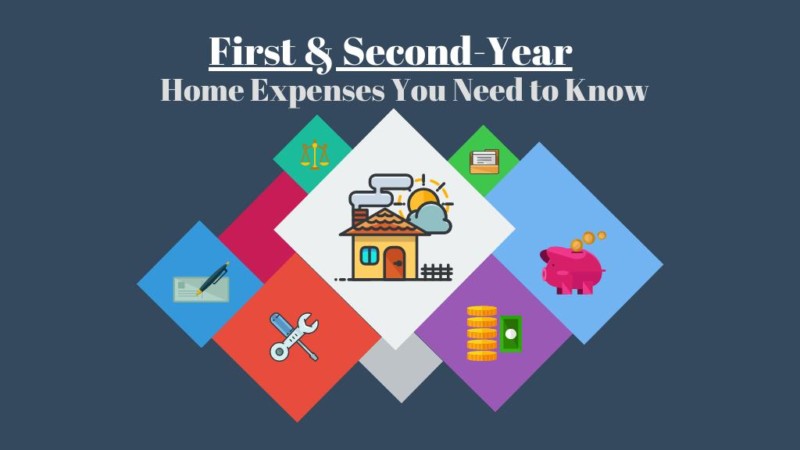You’ve finally done it! Your quintessential American Dream life is unfolding before your eyes as you open the door into your newly purchased home. While the path toward this realized vision was long, you took each step carefully and your efforts culminated into the new space you can now call home. However, your work is not done. There are a number of important expenses that come after you close the deal on your house.
Beyond your mortgage exists a spectrum of ancillary costs tied to your new home ownership, and we’re here to shine a light on these oft-forgotten costs. From regular maintenance to property taxes, let’s take a deep dive into the first and second-year home expenses you need to know about.
1. Property Taxes
If there is something every new homeowner should know about property taxes, it’s the simple fact that they fluctuate. They vary by state, city, ordinances, and even more granularly by home. In order to get the most comprehensive look at how your property tax liability lines up, check out Tax Foundation’s property tax lookup tool.
Property taxes will likely take up the largest chunk of your hidden home costs so you should be prepared to allocate funds to cover those bills as they come so you have money left over for design and decoration.
2. Homeowners Insurance
Getting a mortgage usually means getting homeowner’s insurance, too. Even if you choose to pay for your home with cash, suiting yourself up with homeowner’s insurance is still in your best interest down the road. At the very basic level, homeowners insurance covers losses caused by lightning, fire, tornadoes, hail, smoke, explosions, theft, vandalism, and more. The average annual homeowners insurance premium is around $1,200, though rates will vary from state to state and house to house.
If that number has you feeling nervous, don’t fret! You can save yourself a lot of money by shopping around, comparing rates, and seeking discounts. both online and off. Examining how your past employment and financial history may be impacting your insurance can also help you save. If you work from home or plan on installing a security system, you may be able to bundle your coverage with another existing policy for a better package deal.
Pro-tip: Be wary of the limitations that may come with your homeowners insurance—these policies tend to only protect your home and belongings inside. In the case that you’ve purchased a condominium, the co-op may require a liability rider for accidents that occur on the property.
It’s also worth noting that most homeowners insurance policies do not cover damages caused by flooding, earthquakes, power failure, or neglect. You’ll need to seek a separate and specialized policy to meet these coverage needs.
3. Utilities
Utility costs range sporadically across the country as different climates call for different energy outputs. For example, the average home in Atlanta, GA will spend $2,615 on utilities annual whereas the average home in Portland, OR will dish out $3,480. If you’re expecting to use your utilities more frequently because of your geographical climate, you should also expect to pay more in the long run to cover those costs.
4. Maintenance
You’ve bought the home, now it’s time to maintain it. Regular home upkeep can be far more costly than you initially think once you take everything into consideration. As a general rule of thumb, you should allocate 1%-2% of the value of your home to maintenance. This funding should cover common maintenance duties like roof inspections, gutter cleanings, filter replacements, and more.
Prices will vary by location, so the allocated funding may be more than enough to support your regular upkeep needs. Your real estate agent or a professional home inspector will likely be able to help you gauge foreseeable costs so you can better plan how you’ll budget everything out.
5. Closing Costs
As exciting as closing on your home may be, you should be mentally and financially prepared to start hacking away at a long laundry list of additional costs.
These expenses include:
- Appraisal fee
- Wire transfer fee
- Document prep fee
- Attorney’s fees
- Title insurance
- Recording fees
- Credit report fee
You’ll also be responsible for covering mortgage taxes, lender application fees, title insurance (the insurance policy for the deed), and any other real estate tax reimbursements if the seller paid them upfront. This can be a hefty lump sum of cash, so it pays to be prepared for these surprise costs. Totaled together, closing costs tend to sum up to about 2%-5% of the entire cost of the home—though final costs will vary state by state.
6. Emergency Funds
There are few things that feel more futile than stashing away money for something that may never happen, but when disaster does strike, you’ll be grateful you took the right steps to prepare yourself. Whether it’s a teen driver backing into your garage or a tree branch landing on your roof after a snowstorm, the repairs needed to restore your home back to sparklng condition cost money. Having a bit of emergency money set aside will give you the peace of mind you deserve as a new homeowner.
Congratulations! Your journey into homeownership is well underway and with these expenses under your belt or on your radar, the pathway ahead of you will be smooth-sailing.





